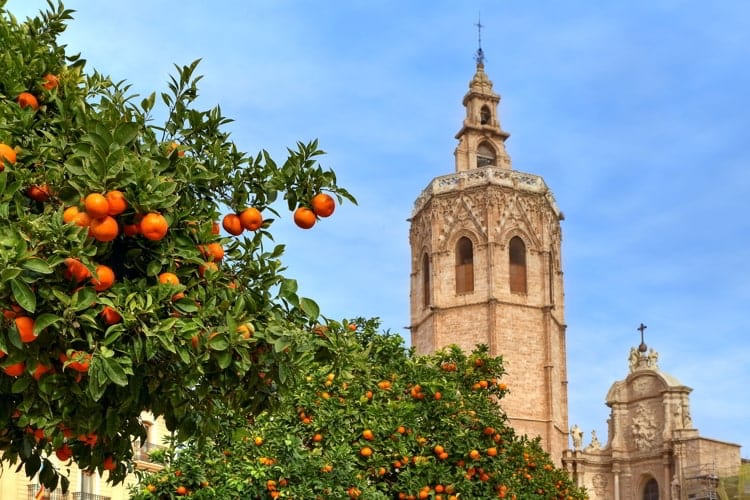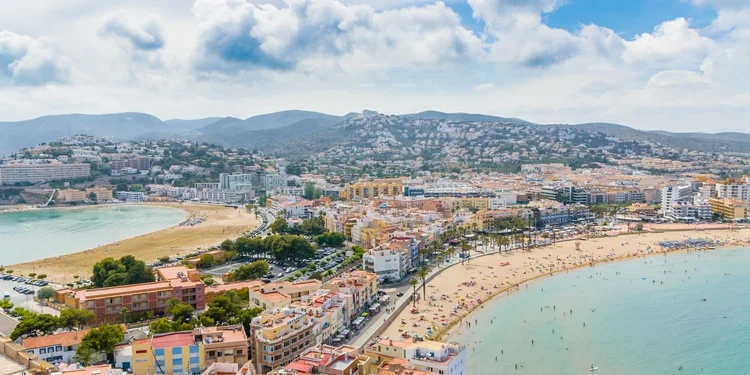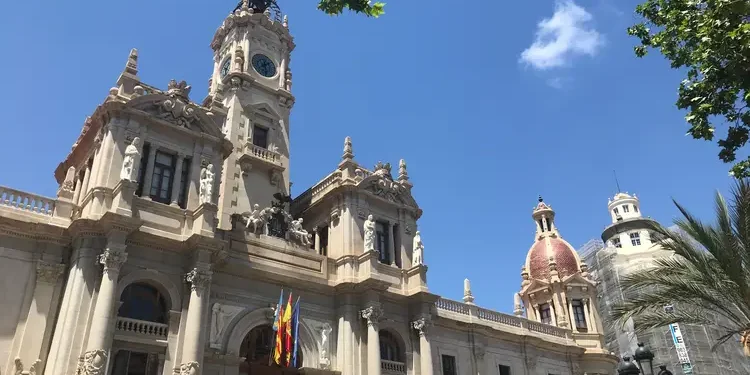Valencia, Spain’s third-largest city, has so many nicknames and claims to fame, it’s hard to highlight just one aspect of this remarkable city.
City of Oranges… Green capital of the future…
Historically it’s been known as La Ciudad del Turia, for the Turia River that passes through the city…
During the rule of the Muslim kingdoms, it was called Medina bu-Tarab, the City of Joy…
Also Ciudad de las Artes y las Ciencias (City of Arts and Sciences) and Ciudad del Intelecto (City of intellect), because of its rich cultural and scientific history, its collection of architectural wonders, and for its large population of students and academics…
Locals like to call it La Loca, The Crazy, for its vibrant nightlife and quirky culture…
Start Your New Life Today, Overseas

Alamy/Rostislav GlinskyThanks to its history of economic prosperity, it’s been called La Pigdan, The Piggy Bank…
For its many monumental religious buildings, it’s also been called La Ciudad de los Mil Templos, City of a Thousand Temples…
Not to mention, it’s also a beach destination…
And the countryside—an agricultural landscape as far as the eye can see—is just minutes inland of the coast…
To the north, the Costa Azahar, or “Orange Blossom Coast,” is thick with aromatic orange trees and is largely unvisited by foreigners, who flock instead to the Costa del Sol and Costa Brava.
Spain produces the majority of oranges for Europe, with two-thirds coming specifically from Valencia.
The famous local citrus is used to make marmalade, liqueur, tea, and desserts… the blossom traditionally appears in local brides’ bouquets, is added to salads, made into perfumes and honeys.
Start Your New Life Today, Overseas
There are even orange massages offered in local spas.
Head south and you’ll hit the Costa Blanca and the beginning of the expat-heavy side of Spain, with a wealth of golf courses, spas, and other planned amenities that attract foreigners.
Also, there are a few scattered golf courses to the north, but 40 or so miles to the south and beyond and they are practically back-to-back—you don’t have to drive more than 10 minutes to get to the next one.
This puts Valencia, Spain, in a coveted position: within an hour of expat communities but distinctly separated from them.
Valencia is the capital of its eponymous region, but with a mere 700,000 or so residents, it’s a small, manageable city that doesn’t feel crowded or overwhelming. The feeling here is laid back.
Spain itself is the 6th safest country in Europe, 29th safest in the world. In Valencia, the crime rates are the lowest among Spain’s big cities, only lower in smaller towns.
Barcelona is especially known for street crime (nothing violent, usually just petty theft of opportunity), and Madrid to a lesser extent, but you’ll feel none of that trepidation here, where locals say they’d have no hesitation leaving their valuables on their beach towel while they take a dip—something you’d never do in Barcelona.
Located on Spain’s eastern coast, on the floodplain of the Turia River as it empties into the Mediterranean Sea, the earth here is famously fertile.
The surrounding countryside is abundant with crops—its world-famous citrus, of course, as well as apples, pears, apricots, peaches, cherries, plums, pomegranates, almonds, lettuce, cauliflower, tomatoes, onion, peppers, artichoke, melons, beans, and more.
Start Your New Life Today, Overseas
World’s #1 Retirement Haven In 2024: This place truly has it all…

Locals tend to think of Valencia as a river city, though it hasn’t been on the banks of the Turia since it was diverted in 1969 due to flood concerns.
The former river bed has been turned into a park that snakes through the city, called the Gardens of Turia—Valencia is ever the innovative city.
As well as a city-wide park, the gardens also provide space and parkland for the magnificent City of Arts and Sciences, a stunning series of architectural works by world-renowned architect Santiago Calatrava (a beloved native son of Valencia) housing the city’s world-famous museums and aquarium (the largest in Europe).
Perhaps the most alluring aspect of Valencia for many is its temperate climate.
This region boasts one of the mildest winters in Europe, with January temperatures comparing with May and September climates in other major Western European cities.
For instance, this is due partially to its Mediterranean location and in part to the ponentà, the local name for the phenomenon that shields the city from rain and warms the region up to 25°F more than without its effects.
Humidity is consistently between 60% and 65%, never more, and the region gets about 2,700 hours of sunshine—300+ days—per year.
Start Your New Life Today, Overseas
I mentioned its famous orange, but Valencia, Spain, has another culinary claim to fame: its namesake paella, more commonly called “arroz a la valenciana,” Valencian-style rice, locally. This classic Spanish dish is served across the country but done nowhere better than right here where it was born.
In fact, a Valencian paella demands 10 certain ingredients, acknowledged by the government as required to earn the name “Valencian”: lima and Ferraúra beans, tomato, chicken, rabbit, salt, olive oil, rice, water, and saffron. If any of these are missing or substituted, or anything else is added, the dish is derogatorily called “arroz con cosas” (rice with stuff).
One little thing to be aware of here is the local language: Valencian.
Although the official language of Spain is Castilian (Spanish), the country has several internal languages, including Basque, Galician, Catalan, and Valencian.
These are not Spanish dialects but ancient languages that belonged to the autonomous communities of Spain before unification.
While in the city itself, you won’t notice the usage of Valencian so much and won’t be frowned upon for not knowing it… but once you leave the city it becomes a cultural requirement.
Expats who settled in the countryside or in nearby towns all commented on the fact that Valencian was a foundation of community life and they had at times felt ostracized for not being able to speak or understand it.
In Valencia itself, though, this won’t be an issue. Every city expat I spoke with made the point that Valencian was less a requirement in Valencia than Catalan is in Barcelona (where you’d do very well to pick up a few words of Catalan or risk being forever labeled an outsider).
When it comes to choosing a home in Spain, it’s hard to imagine a better lifestyle than that offered by Valencia…
Bonne route,

Kat Kalashian
Editor, In Focus: Europe










